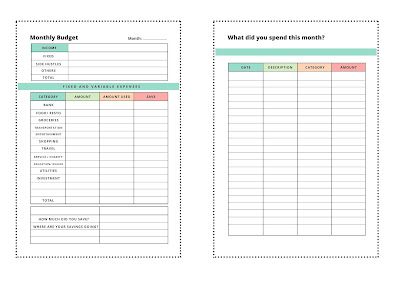Learn how to manage debts
It's been two years since the global financial
crisis hit us all. Many businesses have closed, and many of us are unemployed.
As a result, we have been unable to meet our basic needs, have difficulty
paying our expenses, and do not have sufficient finances to repay our loans.
When we fail to pay our debts, they
accumulate, and we are more likely to be unable to pay them. We must return to
the basics in this scenario. We must devise a strategy for covering the costs.
To make a plan, we must:
Understand your net worth.
One of the things we take for granted is
this. When we make money, it just passes through our hands and is quickly
spent. We tend to overlook its importance. We are unaware of our earnings.
To figure out your net worth, make a list
of all of your earnings and their sources. You will be able to determine your
real net worth by writing them down.
Make a list of all of your monthly
expenses.
It's scary to list your spending since you
will see if your net worth can support your monthly expenses.
I initially made a list of all my
expenses, including monthly utility bills, credit card payments, and daily
necessities. I was terrified. It had been a horrible experience. That is to
say, I don't have any money left to save, and this hit me hard. Where will I be
able to obtain additional funds to meet my daily requirements? This question
has bothered me so much.
My argument is that knowing your monthly
expenses is essential for understanding your financial situation. So, make a
note on all your monthly utility bills, and you'll be able to figure out what
monthly spending is appropriate for your net worth. You must either work harder
or reduce the costs if your expenses exceed your net worth.
If you're still stuck on where to begin or
what to write, I created a budget spending format that I utilized in my journal
every month. It allows me to keep track of my savings and expenses. If you'd
like to try out this format, drop me an email, and I'll send you a free pdf
copy.
First, pay yourself.
When I had steady employment, I made the
mistake of paying myself first. I was unable to put money aside for savings.
Whenever I earn a paycheck, I promptly pay my monthly payments and reward
myself with expensive meals or useless stuff. There was no more money to save.
It is for this reason that I advise you to pay yourself first. Set aside a
minimum of 10% of your paycheck for savings. Imagine you have a large debt that
needs to pay off immediately before you can do anything else. You will have an
emergency fund when you have built up your savings.
Track your debts.
Lists of debts are also frightening. Yes,
we don't want to see those loans pile up since it causes us stress. But did you
know that when you keep track of your debts, you can see which ones need to pay
off first? Yes, when you write it down, you will see who is going to expire
first and which debts have higher interest rates. You can then plan out which
debts should pay initially.
Some argue that paying off the debt with
the highest interest rate first will prevent it from piling up. Others would
advise settling a lower-value loan first so that you can quickly erase one
debt. It doesn't matter which strategy you use as long as you have a clear
objective of paying off your debt. Click here for more.
To be clear, I am neither a financial
analyst nor a specialist in this sector. I'm also having trouble paying off my
debts, which I'm currently attempting to do. You may also learn more about how
to manage your debt effectively during times of volatility by going here.
These are my current projects. I
understand there is no way to eliminate all bad debts without miracles. We must
take action and overcome this process. To reach financial freedom, let's take a
small action.
Let's be friends and connect with me on Facebook | Twitter | Instagram | YouTube | Pinterest














